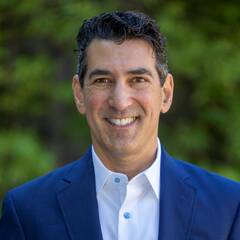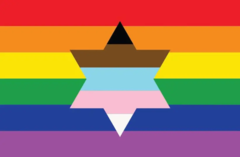faith in a time of uncertainty
09/20/2023 12:00:43 PM

Sermon, Erev Rosh Hashanah
September 15, 2023
High Holy Day sermons feature two sometimes opposing features. Their themes represent the times, values, and priorities that span not only decades but centuries and millennia as well. But they are also like postcards in that they represent a particular moment in time. Ideally, they include both timeless tradition and the zeitgeist of the times—the push and pull of our sacred tradition and our modern era.
Let’s start with the zeitgeist of the times. I don’t ever remember a time in my life when people have felt so overwhelmed by the world around them. One of the great joys of being a rabbi is that I get to share on a regular basis in the joys of people’s lives, so I know there are moments being celebrated in this community, and at the same time, so much of life seems to be spinning out of control.
I’ve spoken with so many of you, in person, on the phone, and I’ve heard and felt the weight of your pain. And I wish I could lift it off you and make the world more predictable. There is no shortage of reasons to feel overwhelmed. There is the existential threat of the climate crisis, the polarization in our country, gun violence, antisemitism, and anxiety about the Jewish state and the future of Jewish legacy institutions. And then there are the issues that confront us in every age: aging, mortality, sickness, and the normal vagaries of life.
Rabbis are talking about this, too. Rabbi David Stern, in a webinar with Reform rabbis, said, “Given that the world is figuratively and literally on fire, I am interested in the question of how and why we act today when there is more than a reasonable doubt that our actions could have any effect at all. I am interested in taking people’s despair or near despair seriously. What if the moral arc of the universe doesn’t bend toward justice? What if an act of righteousness today is not stored up anywhere, and while it might have a present impact, it does not bend the arc at all? Would you still do it? Would you still give the tz’dakah, teach the child, make Shabbat, speak the kind word, opt for compassion over judgment?”
And then I was moved deeply by his final question: “What happens when we are challenged to locate meaning in something other than a reliable outcome?”
And those questions bring me to the teachings of our tradition, because this is not the first time we have faced doubt, and this isn’t Judaism’s first rodeo with pervasive uncertainty and a world turned upside down. In fact, a good chunk of our tradition is not about certainty but about acting in the face of uncertainty. How? With faith.
Some religions speak regularly about faith. In our religion, we tend to speak a little more carefully about faith, as we are descended from ancestors who were God-wrestlers, starting with Jacob. We may also speak in a nuanced way about faith because we rabbis wish to make clear that there are and have always been members of our people who questioned their own faith, felt little faith, or no faith at all in God, even when many of those same individuals were pillars of our religious life.
The term we tend to use in Jewish life for faith is the Hebrew word emunah, generally meaning faith or trust. Emunah can mean faith or trust in God, but it doesn’t have to be only that. It could be faith based on an inner conviction that there is some greater power that pulls us to a higher purpose and that there is a higher vision for our world. This could be just a hunch, but hunches are a great place to start.
Let’s look a little more closely at Rabbi Stern’s questions. How do we decide what kind of people to be in a world that seems perilously uncertain? What tips our answer in one direction or the other? How do we talk to ourselves when we have doubts about life and the nature of the universe?
Tonight, I present myself before you as one example. I grapple with the weight of the world, too, and although I truly cherish sharing in the totality of the human experience with you, sometimes the weight is terribly heavy, and the pain hurts my heart.
As Dr. Adriane Leveen, bible professor at Hebrew Union College writes, “Most folks that I talk to recognize that we are not in a sustainable place when it comes to climate. We are now experiencing . . . drought; hurricanes; flooding; and vast areas filled with smoke that send millions indoors. Many of us feel deep grief in face of such widespread devastation and suffering. We fear what lies ahead.”
I try to take comfort from the notion that I don’t face this alone. I face it with you and with our Jewish traditions and ancestors. The ancient rabbis—the creators of the Judaism that forms the basis of what we practice today—knew that uncertainty is the stage on which all human beings act out their lives. For the rabbis, Dr. Alyssa Gray of Hebrew Union College, writes “a proper Jewish path is to act with hope and trust.”
The rabbis “understand that God’s way of working in the world is mysterious and baffling, but they are confident that God warmly approves of compassionate human acts of solidarity. We thus act for other human beings in the world not in spite of God, but with the hope and trust that we are in fact acting as God would have us act. In acting for other human beings, we not only create bonds with them, but also with God.”
A story about Rabbi Akiva gives us additional insight into a world of uncertainty. There’s an argument between the rabbinic sage and a Roman soldier, who says, if your God loves the poor, why doesn’t your God support them? His premise is based on the theology that we get what we deserve and that the poor must be in their condition because they are being punished by God. Rabbi Akiva, perhaps influenced by Job, doesn’t believe in strict justice.
With every eloquent answer from Rabbi Akiva, though, the soldier refutes his reasoning. Finally, Rabbi Akiva gives up arguing and instead quotes Isaiah: “Is it not to share your bread with the hungry, and that you shall bring the poor that are cast out to your house?” And then Rabbi Akiva rhetorically asks, “Aimatai, when? Achshav, now, is his answer.”
The Talmud seems quite comfortable with Akiva reaching a stalemate, and in the absence of theological certainty, what is left, in the end, is the next mitzvah. Rabbi Akiva leaves us with this insight: when faced with the reality of human suffering, we can’t know why, but we can figure out how to act, and we had better do it now.
Time and again our ancestors have had to figure out how to face the realities of the world and the uncertainty of whether the moral arc of the universe would bend toward justice in their lifetimes.
While uncertainty is fundamentally frightening and destabilizing, we can find strength in a wisdom tradition that keeps pointing us toward right behavior and a belief in the possibility of better tomorrows. In the world of uncertainty, you and I, as well as Rabbi Akiva, are all in this together, trying to figure out how to find the most meaningful way to live.
It may be irrational to focus on doing good in a world of incertitude. But what other way is there? And aren’t our lives full of things that are irrational? Is love of music rational? That certain songs or certain movies can leave me in tears time after time? Is it rational to love another person as much as we do? Our entire lives are built on irrational leaps of faith. In an interview, Elie Weisel was asked what’s the next step, how do you move on? Despite all he had survived, he answered, there are two words that I always say, and those two words are, “and, yet.”
There’s a passage in the Talmud where the rabbis share with each other particular verses from the Bible that make them weep because of the great inequities in the world. We read a poignant line where Rabbi Ami says, “ulai yeish tikvah, maybe there is hope.” Rabbi Asi answers him: “All of this (suffering), and only maybe?”
Rabbi David Stern offers this perspective: being able to say ulai, maybe, equals yeish tikvah, there is hope. In the face of human suffering, in spite of all the destruction, the fact that we can still muster an ulai, a maybe—maybe human compassion will in fact alleviate suffering, maybe we will reverse the damage we’ve caused to our planet, maybe we will find a way to live in peace with each other—maybe means there is hope after all.
Like our ancient ancestors, we can find a place of comfort and inspiration in doing the next mitzvah, the next right deed. Doing a mitzvah and having hope are expressions of faith. Trusting in ulai, that maybe there is a path forward, is an act of faith.
I want to share a poem published in 1988, by W.S. Merwin, two-time Pulitzer prize winning poet. In 1977 he came to the Northern coast of Maui, to a lush and rare, 19-acre palm forest, land that had been designated as agricultural wasteland. He took this place that wouldn’t even grow native plants, and now 45 years later, it is a protected conservancy, called the Merwin Conservancy with 400 different species of palm trees and 3,000 palm trees in total. What happened is that he woke up each morning and planted a sapling, and then when it got too big he had other people do some of the planting for him. His actions provide hope and his poem, called Place, inspires.
On the last day of the world
I would want to plant a tree
what for
not for the fruit
the tree that bears the fruit
is not the one that was planted
I want the tree that stands
in the earth for the first time
with the sun already
going down
and the water
touching its roots
in the earth full of the dead
and the clouds passing
one by one
over its leaves
I ask us: what if it were the last day of the world? The poet suggests that he would plant one more tree, one more act of hope and faith, simply because that is what he does, even in the face of death and uncertainty.
To acknowledge a world spinning in scary directions and still double down on our shared humanity and making our world holy—well maybe that’s faith.
Doing the things that add meaning to our lives, to me, is what faith looks like. So, friends, I encourage us all to bring our faith to bear in a time of uncertainty. I have faith that all of us were created to make the world a holier, kinder, more loving place. I believe in ulai, in maybe. I believe in you and me—in us. And I believe in our shared future. Shanah tovah.
---------------------
Footnotes forthcoming.






